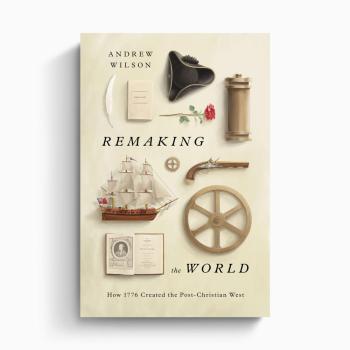Visit the Patheos Book Club for more conversation—and a book excerpt—from Monsters in America.
It's a staple of American thought that America is a land of innocence. We typically mean that in two ways: we were founded innocent of the offenses committed by so many older cultures and nations, and we are continuously innocent in our dealings. American exceptionalism is grounded in the firm beliefs that we are the greatest nation in the world because we don't commit arbitrary acts of aggression, because we are a land founded on freedom, and because every American has the opportunity to pursue and find happiness. In The Irony of American History, Reinhold Niebuhr wrote that until the 20th century, the United States didn't even know about "the use and misuse of power"—even a Christian realist like Niebuhr, immersed in the contest between Western capitalism and worldwide communism, may have bought into that myth, despite the genocide of Native Americans, despite slavery, despite wars for territory like the Mexican-American War and the Spanish-American War.
What Scott Poole's new book Monsters in America gives us in opposition to that myth of eternal American innocence is an alternate reading of American history that acknowledges the "dark corners of American history." Although we may think we have always exercised power and influence benignly and managed our affairs with no blood on our hands, Poole looks at the monsters that inhabit our literature and culture, and suggests that they are always telling us about our feeling—known and unknown—about American culture.
In these tales of monsters, haunted houses, murderers and fiends, and frightening sexuality, Poole argues that America is dealing with the horrors of slavery, genocide, miscegenation, atomic weapons, unleashed female power, and the threat of apocalypse. Like many cultural critics (including this one), he understands the books, movies, TV shows, and urban legends we choose to celebrate and consume as having currency because they help us make meaning, often without our knowing it. To Poole, these stories and the images they contain are not metaphors; they are true, in the sense that they tell us something real about us as a people. And so while some of the works he covers may seem ephemeral or inartistic, Poole suggests (and supports his contention successfully) that "[i]n American history, the monsters are real. The metaphors of the American experience are ideas hardwired to historical action rather than interesting word pictures."
Monsters mean something.
And we find monsters in American culture since its earliest beginnings.
Poole's most compelling readings of the monster as essential metaphor are his readings of slavery and racism, of the treatment of women, and of our fears of social, cultural, and/or political apocalypse. Poole notes Frederick Douglass' characterization of slavery as "America's pet monster," and he argues that the monstrosity of African slaves was used both as an excuse for slavery and a compelling reason to keep slaves controlled and under the dominion of whites. Comparisons were often made to apes and orangutans, frightening and powerful humanoid beasts, and even someone as supposedly enlightened as Thomas Jefferson supported the essential difference between whites and blacks, writing that African are "inferior to whites in the endowments of body and mind," and suggesting in a tale of orangutans having a penchant for black human women an equation between this deviant animal sexuality and the purported desire of black men for white women. "Racism," Poole suggests, "became a new doctrine of monsters in America," and it continued long past the end of slavery.
In his reading of King Kong (1933), for example, Poole reads the movie, along with many other critics, as a tale of white women menaced by a bestial African. The film "made use of white supremacist imagery tapping into centuries of white folklore about Africans and apes and the alleged hypersexuality of black men. Certain aspects of the narrative remind us how often America's monstrous metaphors are uncomfortably close to historical reality." Kong is subdued and taken from Africa in captivity aboard a ship; in America, he is held for the use and amusement of his white male masters. Upon his escape, he proves to be dangerous—and dangerously human—and only his violent death will put things right.





